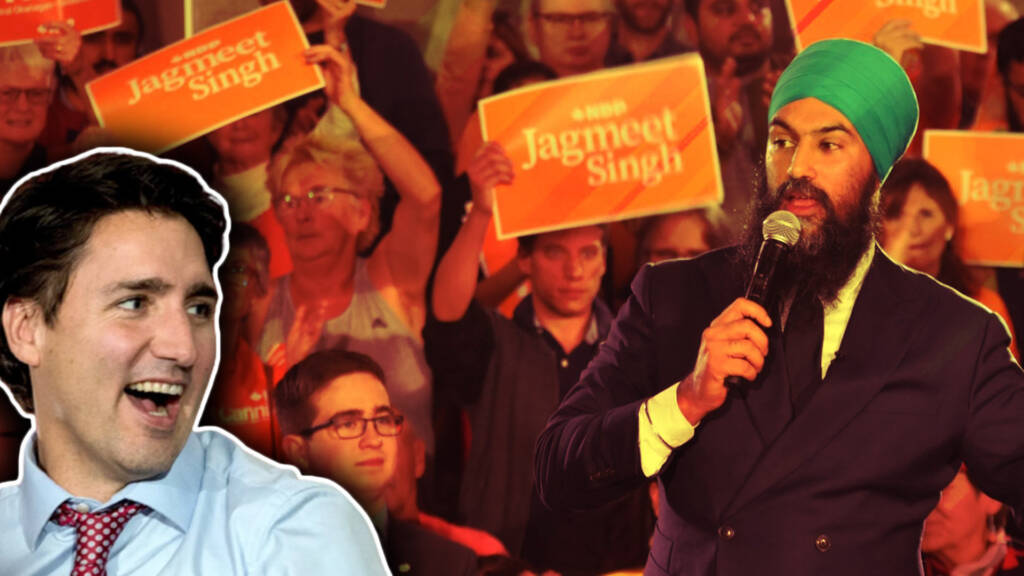In recent times, the New Democratic Party (NDP) in Canada finds itself at a critical juncture under the leadership of Jagmeet Singh. The party’s internal dynamics and policy decisions have raised significant concerns among both members and the public, leading to questions about its future direction.
The NDP’s voter base is going off the cliff. Jagmeet Singh got an 81 per cent endorsement from delegates to his party’s weekend convention in Ottawa, a worse result than expected. When he was first elected leader in 2018, Singh scored 91 per cent support; in 2021, that dropped to 87 per cent.
One of the main challenges faced by Singh is the party’s stance on international issues, notably the Israel-Palestine conflict. A pro-Palestinian demonstration on Saturday resulted in the party suspending the passes of four delegates, with chaotic video footage of the row making the rounds of social media.
Read More: Jagmeet Attempted to Paint Himself Pro-Israel. But, Sarah Jama Exposed NDP’s Radical Love
Delegates went on to debate an emergency resolution calling for Canada to condemn “Hamas terrorist attacks,” demand an end to Israel’s “total siege of Gaza which is prohibited under International Law” and mandate a ceasefire. But some delegates wanted the party to go further, with one telling CTV News, “The NDP must stand against the genocide of the Palestinian people, who have had a noose around their neck for decades.”
This highlights internal divisions regarding Canada’s position on the matter. This internal strife underscores a broader struggle within the NDP, where traditional working-class concerns collide with the identity politics of progressive activists.
The NDP has become an uneasy marriage between the two camps, prompting some of its supporters to seek a divorce. According to Abacus Data CEO David Coletto, the NDP are “losing about one in five of their past supporters, with more of that going to the Conservatives than the Liberals.” The right is seeing dividends from positioning itself as the champion of the working class — without the woke politics.
The NDP’s relationship with the Liberal Party has also come under scrutiny. The 17-month-old confidence and supply deal with the Liberals, aimed at keeping the government in power, has left some delegates frustrated. Many perceive it as a business arrangement rather than genuine political cooperation, leading to dissatisfaction within the party ranks.
Another contentious issue is the NDP’s push for a universal pharmacare program. While the idea of accessible healthcare resonates with many, the practicality and financial feasibility of such a program have raised concerns. The parliamentary budget officer’s estimate of an $11 billion cost for the first year has cast doubts on the NDP’s proposal. Moreover, the disconnect between the party’s vision and the public’s preferences regarding healthcare reform poses a significant challenge.
Singh’s leadership and the NDP’s future hinge on how these issues are navigated. The party’s declining support, evident in decreasing endorsement percentages over the years, reflects the urgency of addressing these internal struggles. The dilemma lies in finding a balance between progressive ideals and the practical concerns of everyday Canadians.
Read More: Trudeau and Jagmeet have a new wild idea to meddle with Canadian Elections
Convention resolutions, while not binding, have added pressure on Singh to deliver on party promises. The proposed universal pharmacare program, in particular, has the potential to be a make-or-break issue for the NDP. Failure to uphold this commitment could result in further erosion of support within the party, potentially leading to a more significant crisis in leadership.
Additionally, Singh faces a delicate balancing act concerning the Israel-Palestine issue. The party must find a coherent and respectful stance that reconciles diverse opinions within its membership base. Failure to do so may deepen internal divisions and alienate both party members and potential voters.
The NDP’s challenges reflect a broader struggle within progressive politics, where ideological diversity sometimes leads to internal discord. As Jagmeet Singh’s NDP party stands at this crossroads, its choices in the coming months will profoundly influence its trajectory in Canadian politics.
Watch More:
https://youtu.be/mSHsdOILAGA?si=lxDge_4eqgRLt47W
